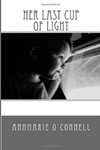66 pages, $14
Review by Lauren Gordon
In her debut full-length prose and poetry collection, What Is a Domicile, Joanna Penn Cooper asks, “Are we all sad walking mistake-filled balloons?” The prose is part documentary and part New York school, where the ephemera of an urban landscape is in juxtaposition against the slow passage of time. The prose poems move from fall to spring like molasses; there is nothing frantic about the prescience of Cooper’s experiences moving, living in New York, being in a relationship, and becoming a mother. “I wonder at everything,” she writes, and it’s true.
Cooper’s voice is static, even when her reflections are not so much passive as they are internal. It lends to that remarkable documentary-feel as if the writing occurs in real-time with the reader audience. In the poem “On the Delicate and Non-Delicate Movements of Weather and Time” she writes: “At 2 a.m. the humidifier sounds like crickets and then I know I should move to the country,” but later in the same poem: “What do you expect? One lifetime is very short, but it’s hard to realize when it’s happening.” The autobiographical framing is where anxiety becomes formalized, where the “we” gets applied to the universal experience of being. It’s a neat trick. You don’t have to be a mother or live in Brooklyn to be able to relate. Continue reading
![[PANK]](https://pankmagazine.com/wp-content/themes/pank/assets/images/pank-logo-large.png)


